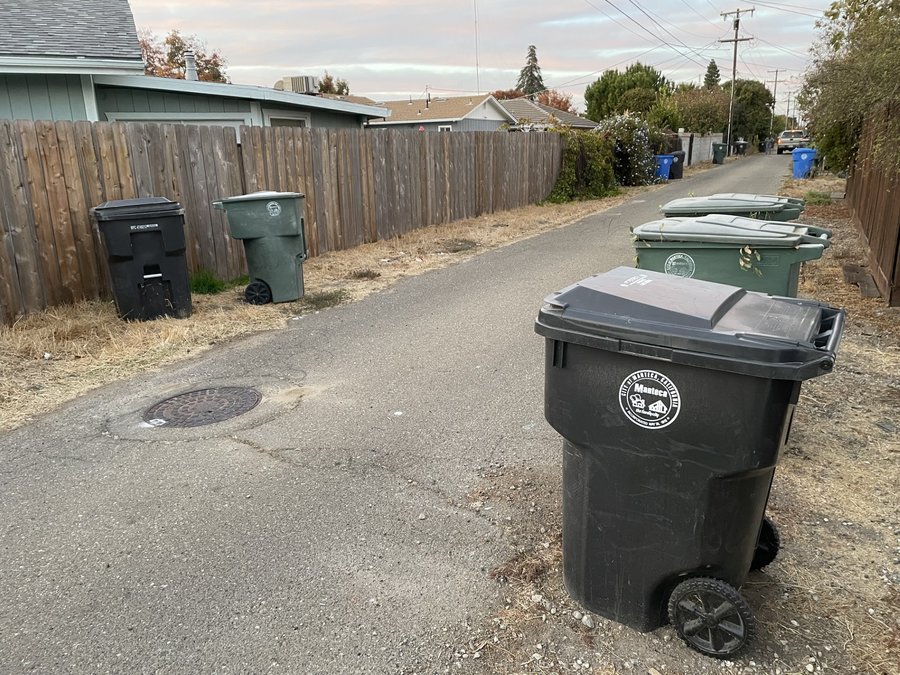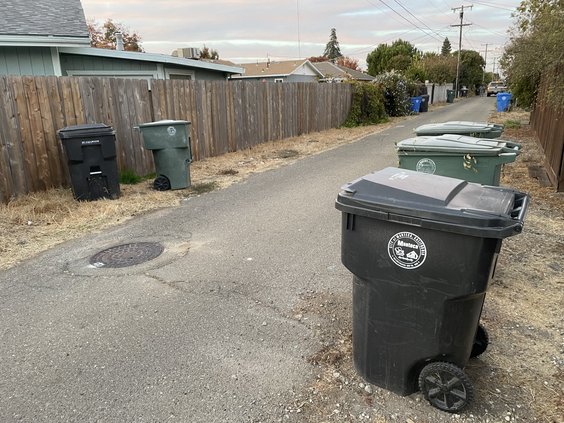Promises from city officials that Manteca is being as transparent as possible are striking at least four Powers Tract residents as rubbish — literally.
Many in the 1950s/early 1960s era neighborhood wedged between Spreckels Park and Manteca High are irked about a letter they received in recent days from the solid waste division.
It states starting on Dec. 2, the city will be ending its 73 year-old practice of collecting garbage from neighborhood alleys.
It will be switched to curbside as is the case with almost all other residential areas in Manteca.
And while Councilman Dave Breitenbucher — who lives in Powers Tract but already has curb service given his home has no alley — noted elected officials were told during the recent rate study that universal curbside service was more efficient, that is not the explanation that was provided residents.
The city notice states “please be advised that due to safety concerns we are no longer going to service carts in the alley.”
The reason that does not sit well is there are residents who have lived in the neighborhood long enough to remember at least three previous city attempts — including 2002, 2005, and 2018 – to stop alley service that was successfully challenged.
They are also irked that given the history the issue has and the fact they feel Powers Tract “seems to be often ignored” because it is an older neighborhood, they are displeased they have only one opportunity — which is tonight — to argue against the move.
The City Council meets tonight at 6 p.m. and then not again until the first day of the switch to alley service.
And while the council can’t act on an item not on the agenda, they are displeased as citizens they weren’t afforded the effort to make their case before elected officials in what has been a hot issue more than once in the past.
In 2002, the deteriorating condition of alleys in residential neighborhoods such as Powers Tract prompted the first effort to nix alley service
Powers Tract developer Ed Powers who built the subdivision in the 1950 was required to include alleys by the city.
The issue with most alleys, including Powers Tract, was the fact they were riddled with potholes.
A few alleys in the city at the time were still dirt.
Neighbors argued since the city required alleys in the first place and they had the same public right-of-way access as streets, the real question was the city’s failure to maintain the alleys.
The city at the time doubled down on the safety issues adding that solid waste vehicles had to deal with “low-hanging” PG&E lines.
When pressed, the city could not produce a single incident in the previous 66 years of downed or sagging power lines in the alleys in Powers Tract that exposed city workers to the risk of electrocution.
The city made another run at ending alley service in 2005.
That time, the city said it was enforcing a municipal code adopted in 1996 that required curb collection and that alley service was not grandfathered in.
Residents at the time reminded several council members of comments they had made three years early that the issue had been settled.
They also noted there were at least a dozen homes that had side yards with gates that were too narrow to get the 95-gallon carts through to place curbside.
That was an issue given the city bans carts from being visible from the street on non-collection days and that organic waste carts in garages can cause odor and even potential fire issues.
Today, there are few, if any such gate issues left as they involved wooden fences that deteriorate over time and as such gates were likely widened when they were replaced.
The council in 2005 directed staff to come up with a plan to repave the Powers Tract alleys and possibly those in other neighborhoods.
In 2008, the city used its own crews and a paving machine after potholes were fixed to re-asphalt the Powers Tract alleys at a cost of $180,000.
A decade later, the city made yet another run at ending alley service in Powers Tract.
It was part of a solid waste collection efficiency study connected with a rate study that had been conducted.
At that time, a consultant determined solid waste collection routes were operating at a 95 percent plus efficiency rate.
Three highest days were Tuesday, Wednesday, and Thursday. Powers Tract solid waste is collected on Tuesday,
Keep in mind collection routes are periodically adjusted to accommodate growth and have likely changes over the past six years.
In 2018, staff also cited illegally stored or discarded items in alleys making the passage of solid waste trucks dicey.
Residents asked the city to produce examples of solid waste incident reports backing up the claim. None were forthcoming.
Says it shows city hall ‘doesn’t
care’ about older neighborhoods
Elected officials four times allowed Powers Tract residents to make their case.
And each time the City Council sided with the residents and not staff.
Several residents over the weekend said if they had the opportunity to fight the staff move and lost that it would be somewhat easier to accept.
But given the history and the fact they had no opportunity for input, or simply to make their frustrations known, they have said it re-enforces their perception city hall doesn’t care about older neighborhoods or the concerns of residents who live in them.
And whether it is an unfair perception, the city has come to grips with the fact their solid waste garbage trucks week in and week out are the vehicles delivering the harshest pounding to streets and paved alleys.
That will intensify when solid waste trips down neighborhood streets will go from to three a week next year as the city implements weekly collection of recyclables and organic waste.
New garbage rates reflect 50
cent a month charge for roads
The new rate schedule implemented 13 months ago and will increase again in Jan. 1 reflects set aside funding for the street division to help compensate the general fund for increased street maintenance triggered by the heavy solid waste collection vehicles.
The monthly rate includes 50 cents a month to cover asphalt wear and tear issues caused by the solid waste trucks on city streets.
The fee was projected to raise $150,000 a month for street maintenance in Manteca.
There are no elected officials on the council when previous promises were made that the matter was settled.
Nor is there any intuitional knowledge on what occurred in the past due to staff turnover.
That aside, several residents said the city’s actions are contrary to promises that have been made in the past several years that they would work to be more transparent.
And while they understand that may not necessarily translate into the city backing off their proposed service after those in the neighborhood are heard, they noted the city invested the time to conduct 80 outreach meetings on the neighborhood level in their bid to educate residents about Measure Q and municipal functions.
To contact Dennis Wyatt email dwyatt@mantecabulletin.com





